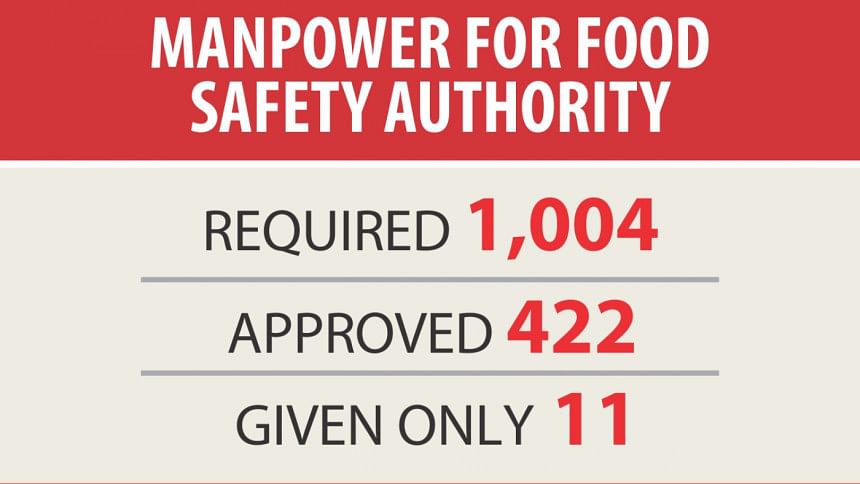Ensuring safe food a far cry

A nationwide outcry against widespread food adulteration had prompted the government to replace the archaic Pure Food Ordinance of 1959 with a stringent Safe Food Act in 2013.
The promises were high-sounding -- there would be a single entity instead of 15 agencies in charge of curbing food adulteration and chemical contamination; there would be dedicated courts dealing with food offenders; and plaintiffs would get 25 percent of the proceeds gained from penalties to be slapped on adulterators.
Three years on, consumers in Bangladesh have very little to cheer about.
It took the government over 15 months to form the Bangladesh Food Safety Authority (BFSA) as mandated by the new law. The idea was that the BFSA would be consumers' one-stop answer to concerns over safe food.
Twenty months have passed since the inception of the BFSA, but the government has not yet sanctioned its required manpower.
It has been eight months since the BFSA sought a 1,004-strong organogram but the body, which has been expected to address the nation's food safety worries, is still limping with just an 11-man workforce.
A chairman, four members, a secretary and five directors -- that is the workforce the BFSA now has under its disposal.
With such a poor strength what the BFSA could pull off are: drafting seven rules required for making the Safe Food Act 2013 operational, assigning over a hundred food and sanitary inspectors with safe food mandates and launching some awareness campaigns.
It was at the height of media spotlight when the ex-food minister Dr Muhammad Abdur Razzaque spearheaded the new law and now that enthusiasm, if not evaporated altogether, seems to have lost much of its steam.
Food safety authority's tall mandate and poor strength surface at a time when a government-run chemical contamination study on 15 food commodities has found presence of excessive pesticide residues, aflatoxin, formaldehyde and hazardous colouring agents in one fourth of the samples tested. The National Food Safety Laboratory (NFSL) at the Institute of Public Health (IPH) conducted the study between November last year and June this year.
This shows high prevalence of unsafe food in the markets and poor oversight by the authorities.
Sources at the public administration ministry said the ministry agreed to sanction a 422-strong manpower, which is less than half the BFSA had sought.
The approval process might take a few more weeks to months depending on the availability of finance.
Asked, BFSA Chairman Mustak Hassan Md Iftekhar told The Daily Star that with a small team he tried his level best to do some groundwork. He acknowledged that it took initial few months for him to understand the enormity and complexities of the task.
Just as he has gained some expertise on food safety regulations and enforcement management, the government decided it was time he joins Bangladesh Small and Cottage Industries Corporation (BSCIC) as its chairman. A Member of Bangladesh Council of Scientific and Industrial Research (BCSIR) was asked to replace him as BFSA chairman later this month.
The outgoing chairman said the BFSA would now pull resources from other agencies. For instance, he said, the BFSA would sign separate contracts with health and food ministries to task inspectors under their disposal with the jobs mandated under the Safe Food Act, 2013.
Currently, the ministries, divisions and departments subordinate to those are directly and/or indirectly involved with food controlling system are: food ministry, agriculture ministry, fisheries and livestock ministry, health and family welfare ministry, industries ministry, commerce ministry, home ministry, law ministry, local government division, National Board of Revenue, Department of Agricultural Extension, Department of Fisheries, Department of Livestock Services, Directorate General of Health Services, Bangladesh Atomic Energy Commission, Department of Environment, Bangladesh Accreditation Board, Bangladesh Standard and Testing Institution (BSTI), Directorate of National Consumer Rights Protection, nine city corporations and nearly 400 municipalities.
Some of the agencies formulated policies and some of the agencies implement decisions.
Against this backdrop, the BFSA was set up with a mandate to authorise food inspectors under Section 51 of the Safe Food Act 2013.
The food inspectors appointed by the BFSA will be responsible for inspecting food premises, taking food samples according to official procedures, destruction of adulterated foods, investigating complaints made to the BFSA, and keeping official records.
Food inspectors as authorised officers will be involved in the investigation of food safety offences, the issuance of warrants by the Food Court and prosecution of offenders.
Since its inception in February, 2015, the BFSA has developed the Food Safety (Labeling) Regulations, 2016, the Food Safety (Food Hygiene) Regulations, 2016, the Food Safety (Contaminants, Toxins and Harmful Residues) Regulations, 2015, the Food Safety (Use of Food Additives) Regulations, 2015, the Food Safety (Sample Collection, Testing and Analysis) Regulations, 2015, and Food Safety Strategic Plan 2016-2021.

 For all latest news, follow The Daily Star's Google News channel.
For all latest news, follow The Daily Star's Google News channel. 



Comments